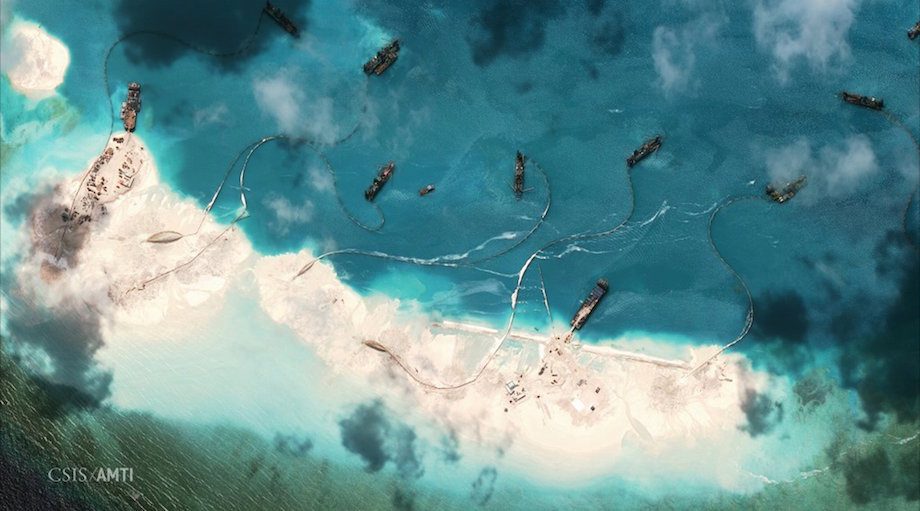Firms in Fed’s Beige Book Fret Over Any Lengthy Baltimore Port Closure
(Bloomberg) — The closure of one of the East Coast’s busiest ports after the collapse of Baltimore’s Francis Scott Key Bridge has so far not led to broad price increases,...


Chinese dredgers deposit sand on the northern rim of the Mischief Reef, located 216 km (135 miles) west of the Philippine island of Palawan. REUTERS/CSIS’s Asia Maritime Transparency Initiative/Digital Globe/Handout
By David Tweed
(Bloomberg) — U.S. President Barack Obama said the U.S. is concerned that China is using its “muscle and power” to dominate smaller countries, hours after China defended its right to build on reefs claimed by Vietnam and the Philippines.
“Where we get concerned with China is where it is not necessarily abiding by international norms and rules, and is using its size and muscle to force countries into subordinate positions,” Obama said Thursday at a forum in Kingston, Jamaica in response to a question about the disputed South China Sea.
China earlier reiterated its right to carry out construction work in the South China Sea after satellite photos this week showed images of Chinese dredgers at work at Mischief Reef in the Spratly Islands, a feature also claimed by Vietnam, the Philippines and Taiwan.
China claims about four-fifths of the South China Sea, home to some of the world’s busiest shipping lanes, under a so-called nine-dash line drawn on a 1940s map. Vietnam, the Philippines, Taiwan, Malaysia and Brunei also claim territory in the waters.
“We think this can be solved diplomatically, but just because the Philippines or Vietnam are not as large as China doesn’t mean that they can just be elbowed aside,” Obama said.
While Obama says the U.S. doesn’t take a position on the disputes, its efforts to defuse tensions have been rebuffed by China, notably a bid in August by U.S. Secretary of State John Kerry to secure a freeze on actions in the South China Sea that might provoke tensions. Obama’s comments come after the U.S. suffered a diplomatic setback as allies like Australia joined the China-led Asian Infrastructure Investment Bank, an institution the U.S. has refused to be part of.
‘Beyond Reproach’
“What we are seeing are the latest steps in a pattern of escalating rivalry” between China and the U.S., said Hugh White, a professor of strategic studies at the Australian National University in Canberra. “This is not just a matter of who owns and controls these islands and what China is doing on the ground, it’s the way that this feeds into different views of the trajectory of each country’s leadership role in Asia.”
China’s foreign ministry spokeswoman Hua Chunying on Thursday again defended the reclamation work. She also detailed the country’s activities in the waters. China is building shelters, aids for navigation, search and rescue as well as marine meteorological forecasting services and fishery services for China and neighboring countries, Hua said at a briefing.
“We put equal emphasis on construction and protection by following a high standard of environmental protection and taking into full consideration the protection of ecological environment and fishing resources,” Hua said.
“It does not impact or target any country, and is thus beyond reproach,” Hua said. “The relevant construction, which is reasonable, justified and lawful, is well within China’s sovereignty.”
Great Wall
An Office of Naval Intelligence report released Thursday said that over the past year China has embarked on a large-scale effort to reclaim land on all seven features that it occupies in the Spratly Islands.
U.S. Pacific Fleet Commander Harry Harris last month said China was building a “great wall of sand.” How China proceeds will be a key indicator of whether the region is heading toward confrontation or cooperation, he said.
Underlying China’s actions in the South China Sea is a challenge to America’s primacy in the region and that country’s “rebalance to Asia,” according to White from ANU, who also cited China’s decision in late 2013 to declare an air defense identification zone over areas of the East China Sea disputed with Japan.
‘Expansive Claim’
“China will confront the United States with an increasingly stark choice,” said White. The U.S. “either steps back and allows China to do exactly what Obama was saying China shouldn’t do — get its way by the sheer exercise of its weight — or it has to decide to buckle up and confront China militarily.”
The ONI report said that China has never published the coordinates of its nine-dash line, or declared what rights it purports to enjoy in the area.
“Despite repeated calls to clarify its claims in the nine- dash line, China has yet to offer a clear, legal rationale of this expansive claim,” it said.
More than a decade of sustained investment in its navy and coast guard, which resulted in the launch of more vessels than any other country in 2013-2014, has given China’s leadership additional tools to pressure or deter rival claimants, the ONI report said.
“China’s land reclamation and construction activities are fueling greater anxiety within the region about China’s intentions amid concerns that they might militarize outposts on disputed land features in the South China Sea,” U.S. State Department spokesman Jeff Rathke said Thursday in a briefing. “We continue to raise our concerns with China.”
–With assistance from Stephen Tan in Beijing.
©2015 Bloomberg News
Join the gCaptain Club for curated content, insider opinions, and vibrant community discussions.


Join the 105,960 members that receive our newsletter.
Have a news tip? Let us know.
Access exclusive insights, engage in vibrant discussions, and gain perspectives from our CEO.
Sign Up




Maritime and offshore news trusted by our 105,960 members delivered daily straight to your inbox.



Essential news coupled with the finest maritime content sourced from across the globe.
Sign Up